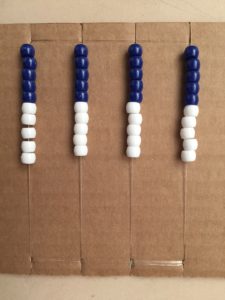In class today we talked about expectations, and what perfect students in the perfect class would be doing. Students came up with lists and then we shared some of our lists. Many students had very similar lists that included things such as:
Students are working diligently
Students are talking quietly when appropriate
Students are listening and paying attention
Students are respectful of the teacher and other students
Students are kind to each other
I was quite impressed with the students’ responses. Both for their obvious understanding of what good classroom behavior looks like, and for their use of fantastic vocabulary as they described these things to me. I am confident that both the students and I are on the same page when it comes to what our classroom should look like.
Next we discussed the base 10 system. We talked about how it is called the base 10 system because we have 10 different numerals (digits):
0 1 2 3 4 5 6 7 8 9
These are the only numerals we have. Quite some years ago some very intelligent individuals in India devised this system of counting and grouping things in tens. It is ingenious how we can use these simple 10 digits in order to represent literally any number we can think of.
We also discussed very quickly what a base 2 (binary) system would look like. In a base 2 system, the only numerals would be 0 and 1. We talked very briefly about how we could count in such a system.
This week we will continue our discussion of base 10 and counting systems. We will also do some exploring of other base systems.
Here is a quick video recapping our discussion today of the base 10 system:
Base 10 review
Have a good one,
-Mr. Potter
